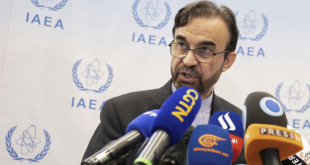 TEHRAN (FNA)- Iran’s oil minister suggested on Sunday crude at $100 a barrel was the lowest appropriate level but said factors like the approaching cold season would push up demand and prices.
TEHRAN (FNA)- Iran’s oil minister suggested on Sunday crude at $100 a barrel was the lowest appropriate level but said factors like the approaching cold season would push up demand and prices.
Oil has fallen from a record level around $147 a barrel in July to around $115 a barrel.
Asked if crude priced at $100 a barrel was appropriate, Gholam Hossein Nozari was quoted by the ministry website Shana as saying, “This is the least price for oil.”
“Regarding the start of the cold season and the increase in consumption, we will move towards an increase in crude prices. These factors can push prices to an acceptable level,” Nozari said.
Iran, the second biggest producer in the Organization of the Petroleum Exporting Countries, has said that the market is oversupplied.
Asked if the issue of commitment to OPEC quotas would be discussed when the cartel meets in September, he said, “If this issue will have an impact on prices, it will certainly be among the main topics at the meeting.”
OPEC ministers are scheduled to meet in Vienna on Sep. 9 to review the organizations output policy. The group is also expected to hold an extraordinary meeting in Algeria in December.
Analysts believe that OPEC members will exert pressure on Saudi Arabia at the upcoming meeting of the world oil cartel in Vienna to cutback its production amid falling energy prices.
Despite the OPEC decision to maintain crude output levels, under US pressure member-state Saudi Arabia raised crude production to 9.7 million barrels per day (bpd) in July, following an oil summit of consumers and producers hosted by the Kingdom in June.
This was Saudi Arabia’s highest output level since 1981, and significantly higher than the informal Saudi OPEC target of 8.94 million bpd.
The Organization of the Petroleum Exporting Countries (OPEC) is pumping almost one million bpd more than its target level of 29.67 million bpd, according to Petrologistics, a consultant company which tracks OPEC supply. Some members of the cartel have voiced concerns about the oversupply of oil in the market.
Asked about Saudi Arabia’s move to hike output, he said, “The extra supply of crude to the market has had an impact on prices. It is not only Saudi Arabia that has an increase in supply, but a rise of supply by some other members can also have an impact.”
Iran has also reported a very modest increase in output. The minister said this month Iran’s output hit 4.235 million barrels per day (bpd), 5,000 bpd higher than the previous record in June. Iranian production last year was about 4.1 million bpd.
OPEC members say that the market is well-supplied and that factors beyond their control, such as speculation, a weakening US dollar, inadequate refining capacity and geopolitical tensions were behind the drive in crude oil prices in the past few months.
Iranian officials blame sanctions that have been imposed against Tehran as a major contributory factor to the last year rise in prices.
Analysts view US-led sanctions against Iran and geopolitical factors as among the main causes of recent hike in oil prices, saying that fears of a new Middle East conflict are behind the new high for oil prices.
Market analysts, specially those from consumer nations, take Bush administration responsible for the price hikes during the last year, saying that these are frequent sanctions and the “rumors of US and Israeli action against Iran circulating in the markets” that affected oil and the dollar.
Prices dropped by around 20 dollars last month after West softened rhetoric in the dispute with Iran.
 Eurasia Press & News
Eurasia Press & News


